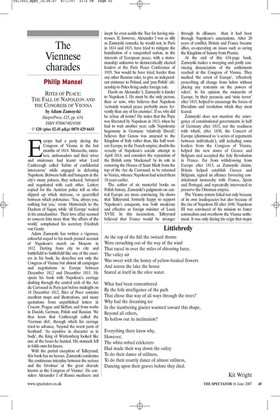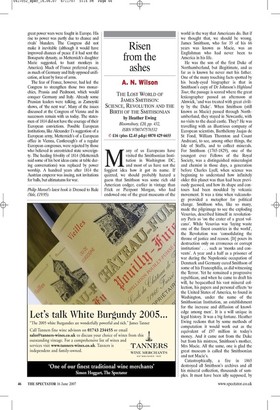The Viennese charades
Philip Manse!
RITES OF PEACE: THE FALL OF NAPOLEON AND THE CONGRESS OF VIENNA by Adam Zamoyski HarperPress, £25, pp. 634, ISBN 9780674024588 © £20 (plus £2.45 p&p) 0870 429 6655 Europe had a party during the Congress of Vienna in the last months of 1814. Monarchs, ministers, ambassadors and their wives and mistresses had learnt what Lord Castlereagh called 'habits of confidential intercourse' while engaged in defeating Napoleon. Between balls and banquets in the city's many palaces, they seduced, betrayed and negotiated with each other. Letters copied for the Austrian police tell us who slipped up which staircase, or quarrelled between which polonaises. 'You, always you, nothing but you,' wrote Metternich to the Duchess of Sagan, while 'all Europe' waited in his antechamber. Their love affair seemed to concern him more than `the affairs of the world,' complained his secretary Friedrich von Gentz.
Adam Zamoyski has written a vigorous, colourful sequel to his much praised account of Napoleon's march on Moscow in 1812. Darting from city to city and battlefield to battlefield like one of the couriers in his book, he describes not only the Congress of Vienna but almost all campaigns and negotiations in Europe between December 1812 and December 1815. He opens his book with Napoleon's carriage dashing through the central arch of the Arc du Carrousel in Paris just before midnight on 18 December 1812. Rites of Peace contains excellent maps and illustrations, and many quotations from unpublished letters in Cracow, Prague and Belfast, and from works in Danish, German, Polish and Russian. We thus learn that Castlereagh called the 'German dirt', through which his carriage tried to advance, 'beyond the worst parts of Scotland'. 'As repulsive in character as in body', the King of Wartemberg looked like one of the boars he hunted. His stomach fell in folds onto his knees.
With the partial exception of Talleyrand, this book has no heroes. Zamoyski condemns `the continuous interplay between the serious and the frivolous' at `the great charade known as the Congress of Vienna'. He considers Alexander I of Russia mediocre and inept: he even scolds the Tsar for having mistresses. If, however, Alexander I was as silly as Zamoyski remarks, he would not, in Paris in 1814 and 1815, have tried to mitigate the humiliation of a vanquished nation, in the interests of European peace, with a statesmanship unknown to democratically elected leaders at the Paris Peace Conference of 1919. Nor would he have tried, harder than any other Russian ruler, to give an independent existence to Poland, and 'pan-Polish' citizenship to Poles living under foreign rule.
Harsh on Alexander I, Zamoyski is kinder to Napoleon I. He must be the only person, then or now, who believes that Napoleon 'certainly wanted peace probably more fervently than any of his enemies'. If so, why did he refuse all terms? He states that the Pope was liberated by Napoleon in 1813, when he had to wait another year; calls Napoleonic hegemony in Germany 'relatively liberal'; believes that Genoa was annexed to the Kingdom of Italy rather than, like half western Europe, to the French empire; doubts the veracity of Napoleon's suicide attempt in April 1814; and considers the reputation of the British army 'blackened' by its role in removing the Horses of Saint Mark from the top of the Arc du Carrousel, to be returned to Venice, whence Napoleon had seized them 18 years earlier.
The author of six masterful books on Polish history, Zamoyski's judgments on central Europe are more convincing. He shows that Talleyrand, formerly happy to support Napoleon's conquests, was both moderate and effective as foreign minister of Louis XVIII. In this incarnation, Talleyrand believed that France would be stronger through its alliances than it had been through Napoleon's annexations. After 20 years of conflict, Britain and France became allies, co-operating on issues such as saving the Kingdom of Saxony from Prussia.
At the end of this 634-page book, Zamoyski makes a sweeping and partly convincing denunciation of the settlements reached at the Congress of Vienna. They marked `the arrest of Europe', 'effectively proscribing all change from below without placing any restraints on the powers of rulers'. In his opinion the monarchs of Europe, by their paranoia and 'state terror' after 1815, helped to encourage the forces of liberalism and revolution which they most feared.
Zamoyski does not mention the emergence of constitutional governments in half of Germany after 1815, nor the readiness with which, after 1830, the Concert of Europe (dismissed as 'a series of arguments between individuals'), still including some leaders from the Congress of Vienna, helped the new states of Greece and Belgium and accepted the July Revolution in France. Far from withdrawing from Europe after 1815, as Zamoyski claims, Britain helped establish Greece and Belgium, signed an alliance favouring constitutional monarchy with France, Spain and Portugal, and repeatedly intervened to preserve the Ottoman empire.
The Vienna system failed not only because of its own inadequacies but also because of the rise of Napoleon III after 1848. Napoleon III was convinced of his mission to foster nationalism and overthrow the Vienna settlement. It was only during his reign that major great power wars were fought in Europe. His rise to power was partly due to chance and rivals' blunders. The Congress did not make it inevitable (although it would have improved chances of peace if it had sent the Bonaparte dynasty, as Metternich's daughter Marie suggested, to hunt monkeys in America). Much of France preferred peace, as much of Germany and Italy opposed unification, at least by force of arms.
The fear of France, however, had led the Congress to strengthen those two monarchies, Prussia and Piedmont, which would conquer Germany and Italy. Already some Prussian leaders were talking, as Zamoyski shows, of `the next war'. Many of the issues discussed at the Congress of Vienna and its successors remain with us today. The statesmen of 1814 did not have the courage of their European convictions. Possible European institutions, like Alexander I's suggestion of a European army, Metternich's of a European office in Vienna, Castlereagh's of a regular European congresses, were rejected by those who believed in unrestricted state sovereignty. The healing frivolity of 1814 (Metternich said some of his best ideas came at table during conversations) was replaced by power worship. A hundred years after 1814 the Austrian emperor was issuing, not invitations for balls, but ultimatums for war.
Philip Mansel's latest book is Dressed to Rule (Yale, £19.95).





















































 Previous page
Previous page